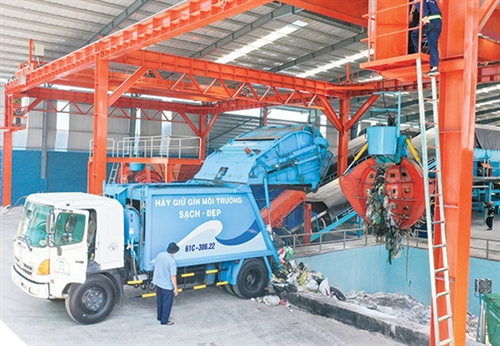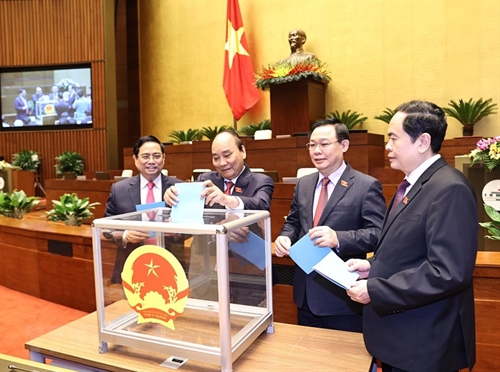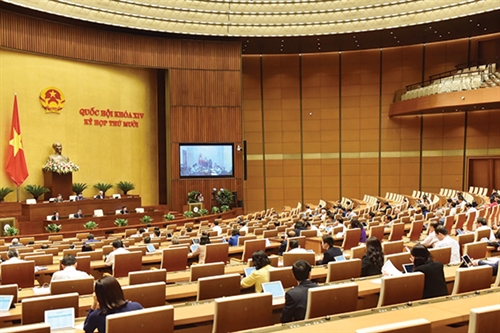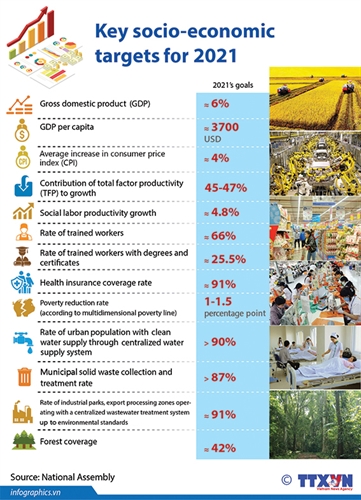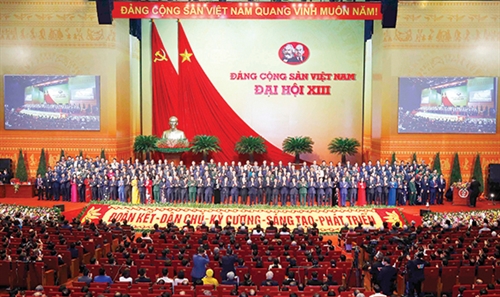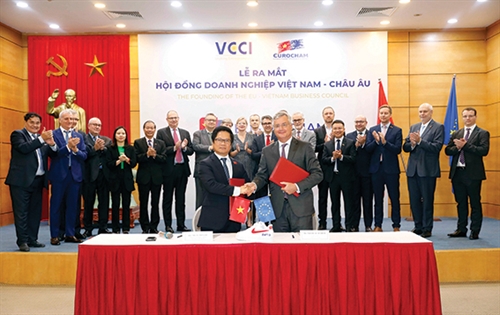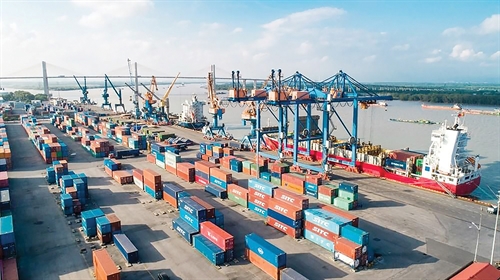The Law Amending and Supplementing a Number of Articles of the Law on Handling of Administrative Violations (the revised Law), passed by the 14th National Assembly at its 10th session and set to take effect in 2022, requires careful preparations as it directly relates to the people’s life. Deputy Minister of Justice Dang Hoang Oanh has recently granted the Online Newspaper of the Government an interview on new points and urgency of the promulgation and implementation of the Law in the coming time.
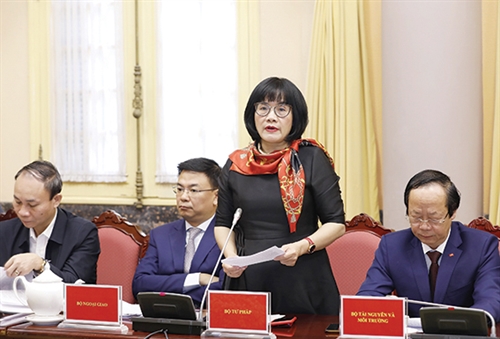 |
| Deputy Minister of Justice Dang Hoang Oanh addresses at a press conference announcing newly promulgated laws, including the revised Law on Handling of Administrative Violations, held in Hanoi on December 11, 2020 Photo: Duong Giang/VNA |
The Law on Handling of Administrative Violations is an important one that covers all aspects of social life. How do you assess necessity and significance of the promulgation of the revised Law?
After seven years of implementation, the 2012 Law on Handling of Administrative Violations (the 2012 Law) has, apart from its achievements, revealed a number of problems and shortcomings that should be revised to ensure suitability to and satisfy requirements of life. In addition, the enactment of such new codes and laws as the 2015 Penal Code (revised in 2017), the 2017 Law on Foreign Trade Management, the 2016 Ordinance on Market Management, the 2017 Law on Management and Use of Public Assets, the 2018 Competition Law, the 2019 Law on Tax Administration, and the 2019 Law on Securities, among others, has put forward an urgent requirement of reviewing, revising and removing some of the current provisions of the 2012 Law to ensure uniformity and consistency of the whole legal system, promptly overcome major difficulties and problems in the practical implementation of the law on handling of administrative violations, and ensure effectiveness and efficiency of the implementation of the law on handling of administrative violations in all aspects of social life.
What are the significant changes of the revised Law?
The revised Law has amended and supplemented 66 out of 142 articles of the 2012 Law, focusing on three major policies. It aims at perfecting the provisions on sanctioning of administrative violations in order to raise their effectiveness and efficiency; improving provisions on subjects, order and procedures for application of administrative handling measures; and perfecting regulations to improve effectiveness and efficiency of the management and implementation of the law on handling of administrative violations. Compared to the 2012 Law, the revised Law has the following new points:
Firstly, it increases maximum fine levels in various fields of state management, including road traffic; prevention and combat of social evils; cipher; national border management and protection; education; electricity; protection of consumers’ interests; hydraulic works; press; and real estate business. It also adds maximum fine levels applicable to such fields as beliefs, foreign affairs, salvage and rescue, printing, cyber information security, and state audit.
Secondly, regarding competence to sanction administrative violations, the revised Law no longer provides or changes a number of post-holders that are competent to sanction administrative violations due to recent organizational restructuring of their agencies or units, such as the People’s Public Security Force, Border Guard, Coast Guard and Market Surveillance Force.
The revised Law also adds a number of new agencies that are competent to sanction administrative violations, such as the Fisheries Resources Surveillance Force, National Competition Committee and State Audit Office of Vietnam, among others.
Regarding the competence to confiscate material evidences and means used in administrative violations, which was assigned to the lowest level of each force under the 2012 Law, the revised Law additionally specifies eight groups of post-holders (mainly from agencies organized in vertical branches at the provincial or inter-provincial level) with the competence to confiscate material evidences and means used in administrative violations regardless of their value. Meanwhile, other post-holders at the grassroots level may confiscate material evidences and means of value not exceeding twice the fine level to be imposed according to their competence. These changes aim to remove obstacles in practice while ensuring controlled powers that commensurate with assigned tasks.
Thirdly, the revised Law contains revised provisions on procedures for sanctioning of administrative violations in order to ensure clarity, transparency and feasibility of the sanctioning process, including provisions on making of minutes of administrative violations; cases and time limit of and procedures for explanation by violators; detection of administrative violations by professional technical devices and equipment; and time limit for issuance of sanctioning decisions, among others.
Fourthly, Articles 76 and 77 of the 2012 Law on postponement of payment, reduction and exemption of fines are revised toward allowing competent organizations postpone payment of, or give reduction or exemption of fines for administrative violations in order to help fined organizations and businesses that face special or unexpected economic difficulties caused by natural disasters, fires or epidemics. The current provisions on conditions for and cases of fine payment postponement, reduction and exemption are also revised to suit reality.
Fifthly, the revised Law provides some new subjects of and conditions for application of administrative handling measures of education in communes, wards and towns, and consignment into reformatory schools, compulsory educational institutions or compulsory drug rehabilitation institutions, in order to ensure its consistency with the Penal Code as well as provisions on minimum age of persons taking liability for administrative violations and number of administrative violations of a single person to be sanctioned.
Sixthly, the revised Law amends provisions on application of administrative handling measures in order to simplify procedures and shorten time limits for completion of jobs for sanctioning of administrative violations.
Last but not least, the revised Law has amendments to general provisions on recidivism, principles of handling of repeated administrative violations, and competence to specify sanctioning of administrative violations and how administrative handling measures are to be applied. The 2012 Law’s provisions on biannual reporting on implementation of the law on handling of administrative violations in accordance with Article 17 of the Anti-Corruption Law are annulled in order to simplify procedures and require responsible ministries, sectors, localities, agencies and units to directly collect statistics and make their own reports. Some new cases where persons must be held in temporary custody according to administrative procedures are also specified in the revised Law.
The revised Law will take effect on January 1, 2022. What should be done by the Government, ministries, sectors and localities to synchronously and effectively implement it?
The mechanism of handling of administrative violations is an important tool of state management to maintain order, discipline and social order and safety. The law on handling of administrative violations has made great contributions to the fight against administrative violations in the new situation. In 2020 alone, a total of 4,827,160 administrative violation cases were sanctioned, 5,843,466 sanctioning decisions were issued and 58,873 persons were subject to administrative handling measures.
In order to ensure the unified and regular leadership and direction of the Government and Prime Minister as well as the regular, continuous, close, synchronous and effective coordination among ministries, sectors, localities and relevant agencies and organizations in the implementation of the revised Law, the Ministry of Justice has advised the Prime Minister to promulgate an implementation plan, focusing on effective direction, management and implementation of the revised Law; organization of conferences to organize the implementation of the revised Law at all levels; review and formulation of legal documents revising, replacing or annulling current ones to conform with the revised Law; provision of professional training and further training in handling of administrative violations; improvement of professionalism in the implementation of the law on handling of administrative violations; and intensification of inspection of implementation of the law on handling of administrative violations.
A list of decrees that need to be amended, replaced or issued in accordance with the revised Law has been issued, defining responsibilities of and assigning specific tasks to ministries and sectors to improve institutions, draft guiding documents and provide guidance on the implementation of the revised Law.
Based on contents of the Prime Minister’s plan and practical conditions, ministries, ministerial-level agencies, government-attached agencies and provincial-level People’s Committees have to work out their own plans to guide and direct the implementation of the revised Law, promote responsibility, proactivity and activeness of their agencies and localities, and ensure their regular and effective coordination in the implementation of the revised Law.
The Ministry of Justice, as the agency responsible for uniformly managing the implementation of the revised Law, considers the synchronous and effective implementation of the revised Law as one of its and the justice sector’s key tasks in 2021. It has recently taken actions within its competence to perform its tasks assigned by the Prime Minister under Decision 126 dated January 26, 2021.- (VLLF)
